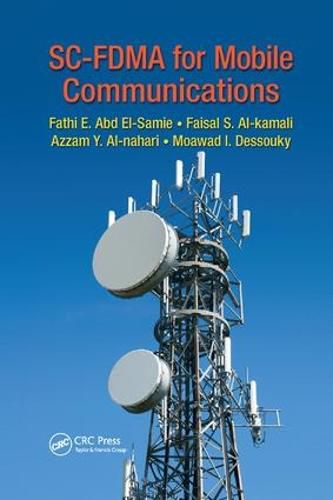Readings Newsletter
Become a Readings Member to make your shopping experience even easier.
Sign in or sign up for free!
You’re not far away from qualifying for FREE standard shipping within Australia
You’ve qualified for FREE standard shipping within Australia
The cart is loading…






SC-FDMA for Mobile Communications examines Single-Carrier Frequency Division Multiple Access (SC-FDMA). Explaining this rapidly evolving system for mobile communications, it describes its advantages and limitations and outlines possible solutions for addressing its current limitations.
The book explores the emerging trend of cooperative communication with SC-FDMA and how it can improve the physical layer security. It considers the design of distributed coding schemes and protocols for wireless relay networks where users cooperate to send their data to the destination.
Supplying you with the required foundation in cooperative communication and cooperative diversity, it presents an improved Discrete Cosine Transform (DCT)-based SC-FDMA system. It introduces a distributed space-time coding scheme and evaluates its performance and studies distributed SFC for broadband relay channels.
Presents relay selection schemes for improving the physical layer
Introduces a new transceiver scheme for the SC-FDMA system Describes space-time/frequency coding schemes for SC-FDMA Includes MATLAB ® codes for all simulation experiments
The book investigates Carrier Frequency Offsets (CFO) for the Single-Input Single-Output (SISO) SC-FDMA system, and Multiple-Input Multiple-Output (MIMO) SC-FDMA system simulation software. Covering the design of cooperative diversity schemes for the SC-FDMA system in the uplink direction, it also introduces and studies a new transceiver scheme for the SC-FDMA system.
$9.00 standard shipping within Australia
FREE standard shipping within Australia for orders over $100.00
Express & International shipping calculated at checkout
SC-FDMA for Mobile Communications examines Single-Carrier Frequency Division Multiple Access (SC-FDMA). Explaining this rapidly evolving system for mobile communications, it describes its advantages and limitations and outlines possible solutions for addressing its current limitations.
The book explores the emerging trend of cooperative communication with SC-FDMA and how it can improve the physical layer security. It considers the design of distributed coding schemes and protocols for wireless relay networks where users cooperate to send their data to the destination.
Supplying you with the required foundation in cooperative communication and cooperative diversity, it presents an improved Discrete Cosine Transform (DCT)-based SC-FDMA system. It introduces a distributed space-time coding scheme and evaluates its performance and studies distributed SFC for broadband relay channels.
Presents relay selection schemes for improving the physical layer
Introduces a new transceiver scheme for the SC-FDMA system Describes space-time/frequency coding schemes for SC-FDMA Includes MATLAB ® codes for all simulation experiments
The book investigates Carrier Frequency Offsets (CFO) for the Single-Input Single-Output (SISO) SC-FDMA system, and Multiple-Input Multiple-Output (MIMO) SC-FDMA system simulation software. Covering the design of cooperative diversity schemes for the SC-FDMA system in the uplink direction, it also introduces and studies a new transceiver scheme for the SC-FDMA system.